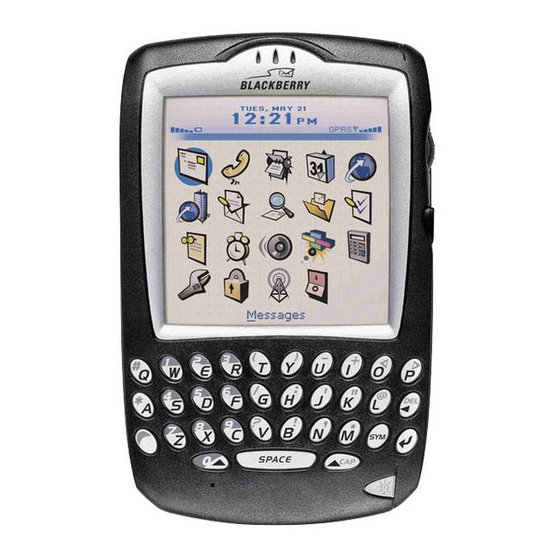- ページ 8
携帯電話 Blackberry R6030GNのPDF 安全性と製品情報をオンラインで閲覧またはダウンロードできます。Blackberry R6030GN 11 ページ。 Wireless handheld

Safety and Product Information
* In the United States and Canada, the SAR limit for mobile handhelds used by the public is 1.6 watts/
kg (W/kg) averaged over one gram of tissue for the body or head (4.0 W/kg averaged over 10 grams of
tissue for the extremities - hands, wrists, ankles and feet). The standard incorporates a substantial
margin of safety to give additional protection for the public and to account for any variations in
measurements.
** In Europe, the SAR limit for mobile handhelds used by the public is 2.0 Watts/kg (W/kg) averaged
over 10 grams of tissue for the body or head (4.0 W/kg averaged over 10 grams of tissue for the
extremities - hands, wrists, ankles and feet). The standard incorporates a substantial margin of safety to
give additional protection for the public and to account for any variations in measurements.
The long-term characteristics or the possible physiological effects of Radio Frequency Electromagnetic
fields have not been evaluated by Underwriters Laboratories Inc. (UL).
FCC compliance statement (USA)
FCC Class B Part 15
This device complies with Part 15 of the FCC Rules. Operation is subject to the following two
conditions:
• This device may not cause harmful interference, and
• This device must accept any interference received, including interference that may cause undesired
operation.
Warning: Changes or modifications to this unit not expressly approved by the party responsible for
compliance could void the user's authority to operate this equipment.
This equipment has been tested and found to comply with the limits for a Class B digital device,
pursuant to Part 15 of the FCC Rules. These limits are designed to provide reasonable protection
against harmful interference in a residential installation. This equipment generates, uses and can
radiate radio frequency energy and, if not installed and used in accordance with the manufacturer's
instructions, may cause interference harmful to radio communications.
There is no guarantee, however, that interference will not occur in a particular installation. If this
equipment does cause harmful interference to radio or television reception, which can be determined
by turning the equipment off and on, the user is encouraged to try to correct the interference by one or
more of the following measures:
• Reorient or relocate the receiving antenna.
• Increase the separation between the equipment and receiver.
• Connect the equipment to an outlet on a circuit different from that to which the receiver is
connected.
• Consult the dealer or an experienced radio or TV technician for help.
Industry Canada certification
This device complies with Industry Canada RSS 133, under certification number 2503A-R6030GE
(BlackBerry 7730) and 2503A-RA6030GN (BlackBerry 7780).
Class B compliance
This device complies with the Class B limits for radio noise emissions as set out in the interference-
causing equipment standard entitled "Digital Apparatus," ICES-003 of Industry Canada.
8
